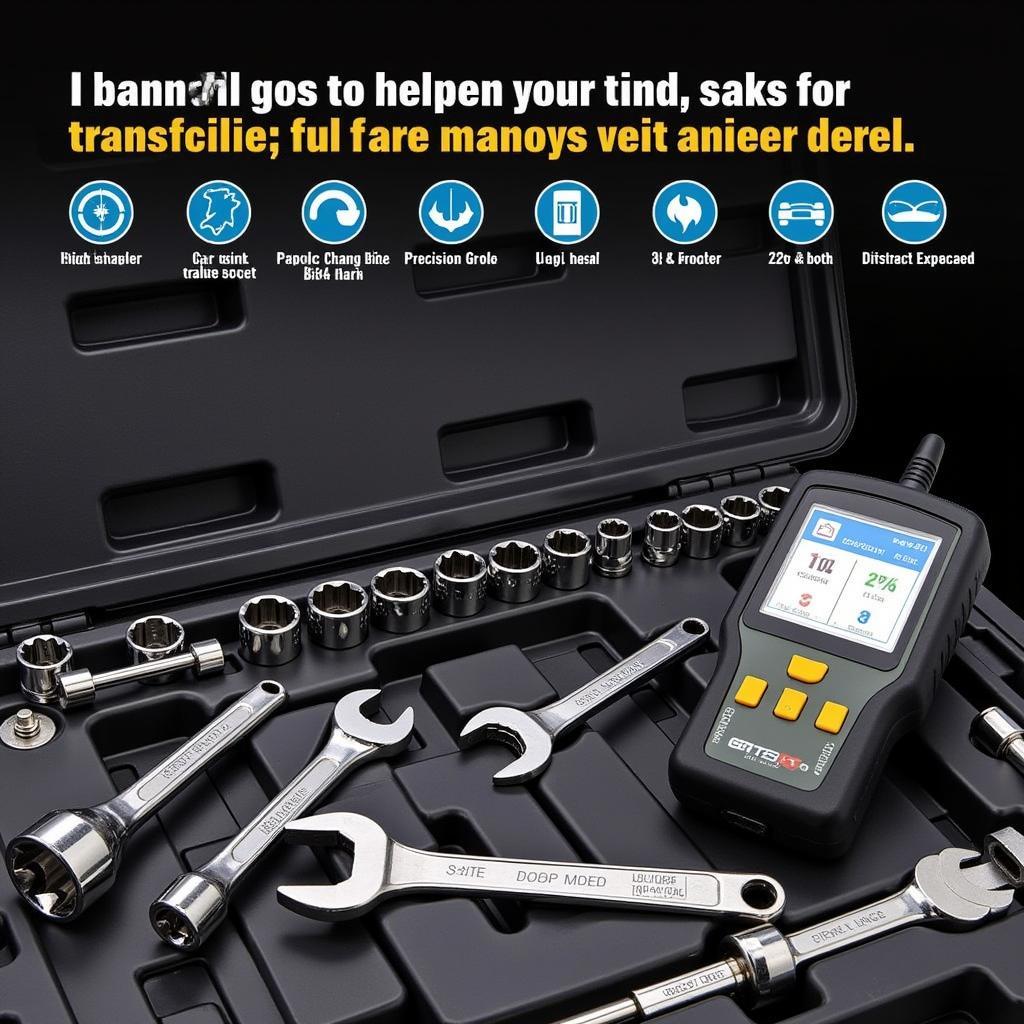Having the right Car Maintenance Tools List can save you time, money, and headaches. Whether you’re a seasoned mechanic or a weekend warrior, this comprehensive guide will equip you with the knowledge and resources you need to keep your car running smoothly. From basic hand tools to specialized diagnostic equipment, we’ll cover everything you need to tackle common car maintenance tasks and keep your vehicle in top condition. Ready to empower yourself with the right tools? Let’s dive in!
Check out these resources for additional car maintenance tips: website to keep track of car maintenance.
Essential Hand Tools for Every Car Owner
Every car owner should have a basic set of hand tools for minor repairs and routine maintenance. These tools will allow you to perform simple tasks like changing a tire, checking fluids, and replacing light bulbs.
- Screwdrivers: A set of Phillips and flathead screwdrivers in various sizes is essential for removing screws and fasteners.
- Wrenches: Invest in a combination wrench set, including both metric and standard sizes, for tightening and loosening nuts and bolts.
- Pliers: Needle-nose pliers are perfect for gripping small objects and reaching tight spaces, while adjustable pliers provide versatility for various gripping and turning tasks.
- Socket Set: A socket set with a ratchet handle offers more leverage and speed when working with nuts and bolts.
- Jack and Lug Wrench: Essential for changing a flat tire. Make sure your jack is rated for your vehicle’s weight.
Diagnostic Tools for Troubleshooting Car Problems
Modern cars are equipped with complex electronic systems, requiring specialized diagnostic tools to identify and resolve issues. These tools provide insights into the inner workings of your vehicle, helping you pinpoint problems quickly and accurately.
- OBD-II Scanner: This essential tool reads diagnostic trouble codes (DTCs) from your car’s computer, helping you diagnose engine and emissions-related problems.
- Multimeter: A multimeter measures voltage, current, and resistance, allowing you to test electrical circuits and components.
- Test Light: A simple yet effective tool for checking if a circuit is live or grounded.
- Pressure Gauge: Used to measure tire pressure, fuel pressure, and other fluid pressures.
Don’t forget to explore reliable resources for car maintenance advice: car maintenance websites.
What is an OBD-II Scanner and Why Do I Need One?
An OBD-II scanner is a handheld device that plugs into your car’s OBD-II port, typically located under the dashboard. It retrieves diagnostic trouble codes (DTCs) stored in the car’s computer, which indicate potential problems with the engine, transmission, or emissions system. These codes can help you or a mechanic diagnose and fix issues more efficiently.
Specialized Tools for Specific Maintenance Tasks
Certain car maintenance tasks require specialized tools. While you may not need these tools for everyday maintenance, they can be invaluable when tackling more complex repairs.
- Brake Bleeder Kit: Essential for flushing and bleeding the brake system, ensuring optimal braking performance.
- Fuel Pressure Tester: Used to diagnose fuel system problems by measuring fuel pressure.
- Compression Tester: Measures the compression in each cylinder, helping to identify engine problems.
- Timing Light: Used to check and adjust ignition timing.
For a comprehensive list of resources to help you with car maintenance, visit: best websites for car advice and maintenance.
How Can I Keep Track of My Car Maintenance?
Keeping a detailed record of your car maintenance is crucial. This can be done using a physical logbook, a spreadsheet, or even dedicated car maintenance apps. Record the date, mileage, and type of service performed for each maintenance task. This helps you stay on top of scheduled maintenance and provides valuable information for future repairs.
“A well-maintained car not only performs better but also lasts longer,” says automotive expert, Michael Stevenson. “Investing in the right tools and keeping meticulous records is key to maximizing your car’s lifespan.”
Car Maintenance Tools List: Investing in Quality
Investing in quality car maintenance tools is a wise decision. High-quality tools are more durable, reliable, and perform better, saving you money in the long run. While cheaper tools may seem appealing, they often break easily and can damage your car.
 Investing in High-Quality Car Maintenance Tools
Investing in High-Quality Car Maintenance Tools
“Don’t skimp on quality when it comes to car maintenance tools,” advises automotive technician, Sarah Miller. “A good set of tools will pay for itself over time through improved performance and reduced repair costs.”
Conclusion
Having the right car maintenance tools list empowers you to take control of your vehicle’s health. By investing in quality tools and understanding their uses, you can save money on repairs and keep your car running smoothly for years to come. Remember, a well-maintained car is a safe and reliable car. For any assistance or further guidance, connect with us at AutoTipPro at +1 (641) 206-8880 or visit our office at 500 N St Mary’s St, San Antonio, TX 78205, United States.
Find helpful websites to track your car maintenance: track car maintenance website. You can also find great resources here: best sites to get help with car maintenance.




Leave a Reply